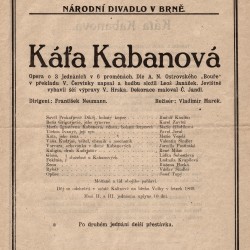
Katya Kabanova in Scotland
Posted 24 Mar 2019
Kátya Kabanovä was first performed in Scotland on 24 August 1964. This was at the King’s Theatre, Edinburgh, as part of that year’s International Festival. The performers were the opera company from the Prague National Theatre, under their principal conductor, Jaroslav Krombholc. The director was Hanuš Thein, with atmospheric sets by an influential Czech designer, Josef Svoboda.
Two sopranos alternated in the title role, Libuše Domanínská and Eva Zikmundová. Viktor Ko?í and Beno Blachut sang Boris, with Jaroslava Dobrá and Jaroslava Prochazková as Kabanicha. Other members of this cast included Karel Berman (Dikoy), Ivana Mixova (Varvara) and Zdenék Švehla as Vanya.
The opera returned to the King’s for the 1978 Festival, this time in a staging by the Frankfurt Opera. Michael Gielen conducted an elegant production by the noted film director Volker Schlöndorff, in designs by Ekkehard Grübler. The excellent German dramatic soprano Hildegard Behrens, famous for her Wagner and Strauss interpretations at the world’s major houses, made her only visit to Scotland in the title role. She was joined by Sona Cervena, a regular guest with Scottish Opera, as Kabanicha. Other singers included Werner Götz (Boris) and William Cochran (Tikhon).
The following summer, in 1979, Scottish Opera launched its first production of the work. This was one of a series of five stagings of the composer’s greatest operas mounted in collaboration with Welsh National. Their musical director, Richard Armstrong, conducted them all, under the direction of Scottish Opera’s then Director of Productions, David Pountney. All were stylishly designed by Maria Björnson, then making her mark at the Glasgow Citizens Theatre.
This cast was led by Josephine Barstow and Swedish guest Kerstin Meyer as Katya and Kabanicha. German-based American Allen Cathcart sang Boris and Peter Jeffes Vanya. Some important Scottish singers took other parts, including William McCue (Dikoy), John Robertson (Tikhon), Cynthia Buchan (Varvara), Donald Maxwell (Kuligin) and Linda Ormiston (Glasha).
There was a further gap until Scottish Opera’s second staging appeared in 1993. The conductor was, again, Richard Armstrong, by this time the company’s musical director. This staging was directed by Mark Brickman, in designs by Richard Aylwin. Helen Field and Elizabeth Vaughan led the cast. The tenors were Richard Brunner (Boris), Anthony Roden (Tikhon) and Iain Paton (Vanya). David Gwynne was Dikoy with Elizabeth McCormack as Varvara.
In 1999 that staging had a very special revival redirected by Rennie Wright, with Richard Armstrong again on the rostrum. While the whole cast was remarkable, the magnetic performance of the title role by Susan Chilcott was quite astonishing. Fine support came from Ian Storey (Boris), Kathryn Harries (Kabanicha), Ian Caley (Tikhon), Richard Coxon (Vanya) and Katija Dragojevic (Varvara).
The last full-scale production in Scotland came from English Touring Opera at the Perth Festival of 2009. James Conway’s staging was conducted by Michael Rosewell. Linda Richardson was Katya, with Fiona Kimm as Kabanicha. Richard Roberts was Boris and Michael Bracegirdle Vanya.
Later that year, Scottish Opera returned to the piece, this time with a small-scale production designed for touring the Highlands and Islands from autumn (19 performances) through to a further four in the spring of 2010. Kally Lloyd-Jones directed, while Ian Ryan did a miraculous job of extracting fascinating sounds from the piano. Katya was shared by Nadine Livingstone and Joanne Boag. Michael Bracegirdle, Vanya in the spring, here took on the challenge of Boris. Other singers included Emma Carrington (Kabanicha), Simon Crosby Buttle (Tikhon), Caryl Hughes (Varvara) and Ben Thapa (Vanya)
Archive
2025
December
2024
November
March
2023
November
March
January
2022
August
July
2019
October
2018
September
February
2017
November
2016
November
October
September
May
March
February
2015
December
October
September
March
2014
October
March
2013
November
February
2011
December
November
September
August
June